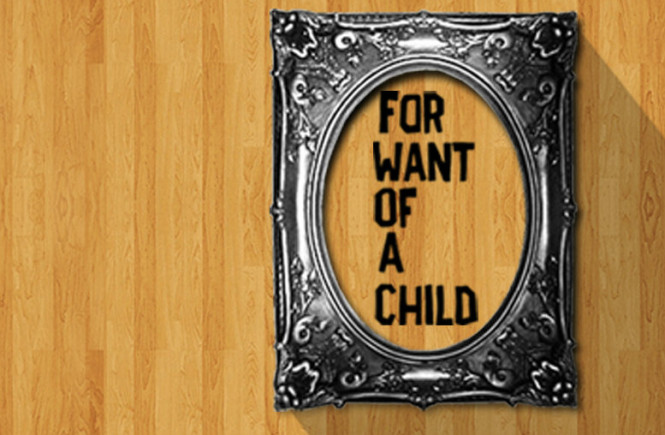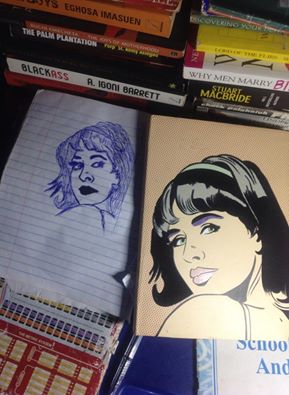As soon as Adegbite Mariam finished talking, cacophony of applause and cheers buzzed through the air. Mariam just finished her own speech; a speech about your family. She wore an infectious grin and I couldn’t help but giggle.
Mrs. Ugwu, my English teacher, had told us at the beginning of the term that all of us in JSS 3 would speak about our family. Her voice kept ringing in my head, “There will be a speech all of you will give till the end of the term. It will be titled, a speech about your family. ” She made a list where Mariam was the number one on it and I was number two thanks to my surname, Adedotun. I felt uneasy, I stood up to ask if I could talk about a relative’s family instead, I had the family of Uncle Juwon in mind. It was a foolish question that was greeted by a chorus of groans. My teacher said no, her disapproval slumped me onto my seat. I sat beside the window that day, our classroom had only two windows and everyone always wanted a window seat, probably to sit in the unsubdued light of the morning. I stared outside vacantly, watching the morning sun play hide-and-seek inside the white clouds. I thought about how I would tell what I saw with my eyes, who would believe I saw a crescent moon in the afternoon and how would others see me afterwards?
I flashed my mind to Mariam’s speech. I knew they didn’t clap for Mariam because of her eloquence, I knew they clapped for her because of what she said about her family. It was so beautiful, little wonder she talked incessantly about her Father. Almost everything she talked about, she credited it to him. Sometimes it would be “My father said… ” other times, it was “I thank my father for my academic success.” She always said the later whenever she improved on her previous result.
I admired the fact that she wore the relationship with her father so boldly, like a new beautiful dress. According to her, her father was into electronics while her mother ran a shoe-selling business. She had three siblings, two younger sisters and an older brother. They hardly bought cooked food outside because her mother was a task master who made sure there was cooked food inside the house. She said her mother didn’t trust those roadside sellers, and how they prepared their food. “They might have cooked with dirty hands and unwashed pots,” Mariam said, mimicking her mother’s voice in a way that made everyone collapse into laughter except me. I was busy thinking about my family. Her mother also created a timetable for chores; and even though they saw it as hard work initially, it became fun as time went on.
“I help my mother in the kitchen and most times clean the house. My two younger sisters take turns to wash dishes while Olamide, my elder brother wash my father’s car” She said, in a revealing proud tone. It wasn’t difficult for her, she said it with the quick ease of people saying what they did every day. Even though she said her father did nothing but go to work, I knew providing for the family and keeping them happy was a difficult work. Maybe she thought her father driving her to the school’s gate every morning and coming to pick her up in the afternoon, wasn’t enough work. She ended with “I love my family so much” and handed the microphone to the vice-principal, Mr. Bode. The crowd had already started cheering her even before Mr. Bode instructed them to.
I toddled into my classroom and sat close to the window. I kept thinking about the speech over and over again, so I could give a name to what I felt. I did not feel envy or sadness but a single emotion, a fuse of envy and sadness. The bell for break rang and everybody excitedly raced to the field. I ambled to one part of the field and sat on a pavement. I brought my knees to my chest and embraced them, it was one of the ways I get to feel comfortable. The air was heavy with the smell of dust.
I thought on what I would say about my family.
I would talk about my mother. I would talk about her favorite shirt; the white oversized shirt that had JESUS I LOVE YOU written on it. Whether she wore the shirt so she can sell her fresh tomatoes and peppers faster or because she really loved Jesus, I couldn’t tell. I couldn’t decide if I should tell them my mother hawked some of her tomatoes and peppers while I stayed at her space each time I returned home from school. Would they laugh if I tell them my mother didn’t own a shop, instead she paid daily for a space to put her table? My mother came home early one Saturday which was unusual. Saturdays were the main days she sold her stuffs, and I knew something was wrong when she came home at that hour. It was not her usual gentle kiss that landed clumsily on my cheek, it wasn’t even her eyes that were liquid in anger. It was the worry lines etched in her forehead.
“ Kilode, maami? ”
My mother asked for water which I served her in a tall glass. She collapsed onto the wooden chair. I sat next to her. I was scared, my mother was acting strange and her breath grew heavier. I inched closer towards her as if I wanted her to notice I was near her.
“I paid money to the wrong people, so I cannot sell today because I couldn’t pay the real people when they came.” She narrated.
How would I tell them those tomatoes and peppers rotted and my mother started tidying homes for people so they could pay her? I followed her one Saturday to Randle Crescent, where she clean Madam Chioma’s flat. That day, I mopped the white tiles while my mother swept the whole rooms. It was a five bedroom apartment each with its own toilet and bathroom. We worked for more than five hours and before we left, she gave us seven hundred naira. My mother scratched her temple, and after some difficulty in finding the right words, she said: “Seven hundred naira, Ma.”
My mother said it in what was almost a question and a disagreement.
Madam Chioma only told my mother to return the money and stop coming if she was not okay with it. I turned away to gather my thoughts, my mouth was opened but nothing was coming out of it.
I didn’t know if I should tell them that after some ums and uhs, my mother told her thank you very much Ma. I definitely wouldn’t tell them that my father stole the money while my mother was asleep.
My father wasn’t one of those fun fathers who roped their arms around their children until the fears they felt vanish.
Unlike Mariam’s father, my father never inflated my ego with words or patted my back anytime I came first or second in my class. He never spoke to anyone unless he was replying our greetings, which he did by nodding his head sometimes or even sniffing his nose. How would I tell them he smelled of cigarettes and cheap whiskeys? When I was in JSS1, my father had always checked my books and taught me a little bit of mathematics but things changed when I entered JSS2. I didn’t know how, but it was swift. He started dipping himself into alcohol in the miserable way broken people do when they want to forget their mistakes.
At first, he drank and smoked secretly but when he met Brother Segun, they started drinking and smoking at the back of the building, at a spot very close to our window. Maybe my father did not know I was within earshot and watching them when he told Brother Segun he slept with Tolani, the willowy girl that lived alone in one of the rooms in our compound. Brother Segun gaped at my father, who fell in hoarse laughter, rolling in the knee-high grass, knife-like tufts of grass sticking all over his body. I did not realize tears streaming down my cheeks until the tears dropped on the base of my palm. The only thing I could say about my father was that he was handsome and that whenever he smiled or laughed, the corners of his black eyes webbed with fine wrinkles. But what more could I tell about my father?
Should I tell them what always happened during weekends when my mother was busy with other people’s chores? Mostly I saw my father on weekends with beer in one hand and a young lady roped in his other hand. I would greet them, and almost every time it was the different ladies he brought that answered. He would come with a different lady the next weekend and he felt comfortable with it. Most times I stayed at the terrace and complete my school assignment because their moans disturbed me. I couldn’t possibly tell my school friends that the last time they visited me at the hospital, it wasn’t a bad fall that brought me to the hospital. I couldn’t tell them that I told my mother what my father did during the weekend and that it was how I ended in the hospital afterwards. I could only remember the slap that stung to my face, it was as loud as a clap, a clap produced by two thick palms. If we were to say everything about our family then I should tell them all these. I should also tell them how one night, my father fell inside the gutter in our street under the influence of alcohol. I should tell them how he was dragged up and brought home and how little children sang behind him those songs reserved for drunkards.
Maybe I should start with Abosede, my elder sister. She was considered the most beautiful in our family although I had always thought it was me. The only thing I knew for sure was that she was very intelligent and nice too. She had always helped me with my assignments whenever she was home and would tell me stories about how school could make one wealthy. I would tell them that Abosede knew how to show gratitude. Mrs. Ugwu had always encouraged us to learn the act of showing gratitude but it was hard, it had to be hard because we couldn’t keep saying thank you to those endless little things people did for us. I knew they would clap when I tell them Abosede showed gratitude so effortlessly.
Like when Brother Segun bought her Coke the day he came to see my father as if he knew she wanted a soft drink that afternoon. Her eyes became soft, with an inner glow and a smile that had a genuine build plastered her face. She repeated her appreciation until my father and Brother Segun left. She shared it with me and told me to always learn to say thank you all the time. Should I tell them what happened after Abosede left secondary school? Abosede worked as a sales girl for almost a year after her secondary school just so she could register for JAMB like her peers. She wrote and eventually passed the exam, but my parents told her they couldn’t afford sending her to the University. It was a Saturday evening, one of those Saturday evenings my mother had returned from work and my father was relaxing after seeing off the young girl he had brought earlier, the door opened and Abosede trotted in with an upturned face. She was smiling and it meant good news so I placed the book I was reading face down on my lap to listen to her. Her eyes danced around us as if to see if we had any clue to what she wanted to say.
“Good evening Papa. Good evening Mama. I passed my JAMB!” She said, almost screaming the last sentence.
My father smiled wryly and as I looked at my mother, she had already buried her face in her lap. When my father told her that University education was expensive and that it was impossible to afford it, and my mother agreed, I watched Abosede stagger out of the house. She stumbled back a step as if there was a different kind of weakness in her knees. I knew she wanted to say something but she kept stuttering and choking out words I was sure she couldn’t hear. Her shoulders drooped, she lowered her head and her neck appeared shrunk. And after a slow, disbelieving head shake, she walked feebly to the door and hit the wall with a satisfying bang as she stormed out. When she came back late that night, she cried so much that we – my parents and I- began to find excuses not to watch her. I couldn’t believe that even at twenty she had no immunity to crying. I remembered my seat mate Adesuwa Kolawole, said it was childish to cry when you are above fifteen but I had never seen it that way. I couldn’t bring myself to accept it because my mother cried almost every day. Abosede got admitted into the University of Illorin after two years and I started calling her Aunty Abosede, but her admission was without the help of my parents. They didn’t ask her either.
I told myself never to talk about Biodun, my elder brother and our eldest child. It would turn me into a laughing stock. Before we moved from Mushin to Orile, Biodun was well-known for all the wrong reasons. Everyone feared him, even his own friends. He was always at the bus stop, with a face of utter nonchalance and waiting for busses to pass by so he could easily extort them. You would only see his irritating dentition when you give him money without arguments. He understood only Yoruba but both of you would get peace when you give him the money he smiled at even without speaking. He never needed your good morning or good evening. It was always about the money. Even though the memories I had of him were depressing, I always remembered in nostalgia, the day he stopped a policeman from destroying the roasted corn of Mama Ruka. Mama Ruka was known for the roasted corns she sold, corns that always got burnt no matter how careful they were roasted. You could tell it was her, assuming you saw her from behind, if the hair was a scattered one and if her wrapper was blue. I was returning from school that day, I hadn’t been more proud of my brother. But that was the only thing good I ever saw him did. He had injured Saheed one night just because he lost a bet to him. Saheed was hospitalized for close to six months, everyone thought he would die but he lived. Policemen came to our house to apprehend my brother but even my parents didn’t know where he had fled to. News started sweeping through our front door a year later about Biodun being into robbery. I knew the school would shout and I might end up getting a suspension if I said my brother was a thief. I knew Mariam would ask if I meant ole and I would nod in affirmation but no one should know about it.
I decided I would miss school the next day. It was the best I could do. I wouldn’t be able to fight the tears when I tell them my father fell into a gutter one midnight and we found him the next morning. Perhaps I should tell them it was his dead body we found as he laid on his stomach on a sharp, short rod that entered inside his stomach. How would I not cry when I tell them my sister, Abosede died of a sexually transmitted disease whose name I forgot immediately the doctor said it? It was just two days before my father died that I lost my sister. We never knew she was having sex for money. A friend of hers said she wasn’t having sex with just humans alone, that having sex with animals paid her more money. My mother flung her hands to the back of her head and fainted. Even though the doctor tried to hide it, I knew my mother was dead the minute I saw the nurses covering her face with that white quilt meant for hospitals. It was a cardiac arrest. But when I should not cry would be telling them what happened to Biodun because although he lived, it was in the disgusting cells of kirikiri. He told me unless God intervened, he was to stay there for life. He had killed a commissioner while trying to steal from him. His friends escaped but because he was with the big bag of money, it was hard for him to escape. I cried the first time I visited him, but after the second and the third visit, I stopped crying.
I wanted to talk about my Uncle’s family because I started staying with them after my family fell apart. Their home smelled of love and peace. It made me drop those my dreams of having powerful possessions I once had, instead I started dreaming of a life full of love. I wanted to be a good soul mate to my partner and a loving mother to my children. I knew that in the fractured home I grew up, it would be impossible but I swore to myself never to let my own family be like that of my father’s. I would love to marry a good husband maybe like the unruffled Ajiboye Sodiq who was the most brilliant student in my class. It would be beautiful to change my name from Adedotun Tope to Ajiboye Tope or simply Mrs. Ajiboye.





6 comments
Wow, so heartbreaking! So many bump faced by humans in their journey through life. Such a troubled family…
Debs recently posted…Save Money Each Month by Taking These Steps
Heartbreaking… Beautiful write-up.
This is the great article…
Wow… I love dis dear…
Keep it up
wow! that’s all I can s, Kudos bro
What a story! Much love bro